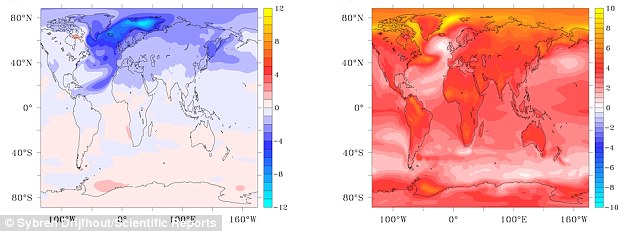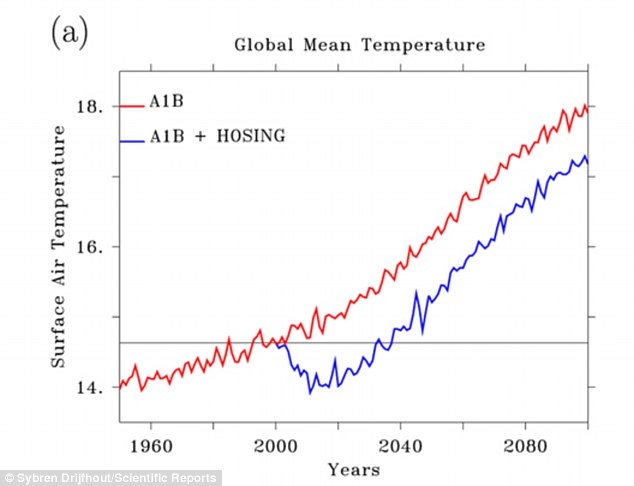Could The Day After Tomorrow happen?
Collapse of ocean currents would cool Earth so much that global warming would reverse for 20 years... but the planet WOULDN'T freeze over
* Study examined the collapse of Atlantic Meridional Overturning Circulation
* They found it would cause temperatures to drop by a maximum of 1.3°F
* This would mask the impacts of global warming by up to 20 years
* But after that temperatures would continue to rise in line with predictions
By Richard Gray for MailOnline
Published: 12:25 GMT, 9 October 2015 | Updated: 22:15 GMT, 9 October 2015
A collapse of the enormous ocean currents that circulate warm water around Atlantic could cool the planet so much that it would obliterate global warming for up to 20 years.
Researchers using climate modelling to study the impact of the scenario featured in the 2004 disaster movie The Day After Tomorrow.
In the film global warming causes the Atlantic Meridional Overturning Circulation (AMOC), which includes the Gulf Stream, to abruptly collapse, leading to the onset of a new Ice Age.
Researchers have modeled the impact of the collapse of the Atlantic Meridional Overturning Circulation and found global temperatures would drop in the first 20 years before rising again. The image on the left shows the temperature anomaly after 15 years while the image on the right shows the world after 95 years
Now scientists have examined what would really happen should the AMOC stop working.
Recently climate scientist warned the currents in the North Atlantic appear to be slowing down at a rate never seen before, possibly due to cold fresh water from the melting Greenland ice cap.
In the latest study, Professor Sybren Drijfhout from the University of Southampton, found that if these currents did stop, the Earth would cool for around 20 years.
However, he calculated it would only result in a maximum of 0.7°C (1.3°F) of cooling after about 11 years before temperatures begin to rise again.
This is unlikely to be enough to bring the widespread freezing of the Northern Hemisphere as shown in the Hollywood film.
The Little Ice Age which brought colder winters to parts of Europe and North America between the sixteenth and nineteenth centuries for example, dropped by a similar amount.
Professor Drijfhout found that after 20 years temperatures caught up to modern levels and then global warming continued unabated at the rates predicted under current scenarios but were offset by about 0.8°C (1.4°F).
However, some areas to the east of the North Atlantic, which rely up on the warm water brought north by the Gulf Stream for their mild climate, take longer to recover.
He said: 'The planet Earth recovers from the AMOC collapse in about 40 years when global warming continues at present-day rates.
'But near the eastern boundary of the North Atlantic (including the British Isles) it takes more than a century before temperature is back to normal.'
Professor Drijhout, whose findings are published in the journal Scientific Reports, used the German climate model ECHAM at the Max-Planck Institute in Hamburg.
Writing in the journal, Professor Drijfhout said the collapse of the AMOC effectively 'obliterates' global warming for a period of 15-20 years.
He added: 'Thereafter, the global mean temperature trend is reversed and becomes similar to a simulation without an AMOC collapse. The resulting surface warming hiatus lasts for 40–50 years.'
Interestingly, he found the effect of atmospheric cooling due to an AMOC collapse seems to cause heat to flow from the atmosphere into the ocean.
Professor Drijfhout found global temperatures would fall to a minimum for 11 years before rising again after the collapse of the AMOC (blue line) compared to current predictions of climate change (red line)
This is similar to what is believed to have happened in the last 15 years where global warming appears to have 'paused' despite rising carbon dioxide levels.
Professor Drijfhout said: 'When a similar cooling or reduced heating is caused by volcanic eruptions or decreasing greenhouse emissions the heat flow is reversed, from the ocean into the atmosphere.
'A similar reversal of energy flow is also visible at the top of the atmosphere.
'These very different fingerprints in energy flow between atmospheric radiative forcing and internal ocean circulation processes make it possible to attribute the cause of a climate hiatus period.'
He added that the recent period of weak warming cannot be attributed to a single cause and is likely due to El Niño and changes in the Southern Ocean.
Professor Sybren said: 'It can be excluded, however, that this hiatus period was solely caused by changes in atmospheric forcing, either due to volcanic eruptions, more aerosols emissions in Asia, or reduced greenhouse gas emissions.
'Changes in ocean circulation must have played an important role. Natural variations have counteracted the greenhouse effect for a decade or so, but I expect this period is over now.'
THE GULF STREAM SLOWDOWN
The Gulf Stream is a powerful current that forms part of the North Atlantic meridional overturning circulation.
This is a system of currents that are driven by the rising and sinking of water in different regions of the Atlantic.
However, research published in March this year showed it is now slowing down at the fastest rate seen in around 1,000 years.
The study shows that the circulation of warm and cold water around the Atlantic Ocean has slowed by 15-20 per cent over the past century.
Scientists say that the increasing flow of fresh water from melting Greenland ice sheets may be driving the slowdown.
The findings suggest that as global temperatures rise due to climate change, areas that are warmed by the Gulf Stream could see temperatures fall, particularly in the winter.


